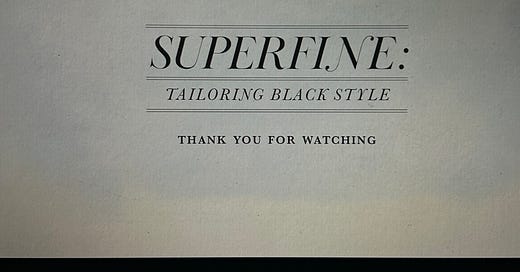I think enough time has passed since the 2025 Met Gala that I finally feel ready to talk about this.
And let me start by saying: I love how much people are enjoying fashion. I really do. The internet has never been more engaged in red carpet commentary, and I think it's great that so many people feel confident enough in their own style knowledge to join the conversation.
But here’s the thing—if you're going to publicly review Met Gala looks, you need to do your homework. Because posting hot takes about who “understood the assignment” without knowing what the assignment actually was... is embarrassing.
This year’s theme wasn’t just another vague reference to glamour or fantasy. It wasn’t “camp,” it wasn’t “heavenly bodies,” it wasn’t “gilded glamour.” It was Superfine: Tailoring Black Style, with a dress code of Tailored for You—a theme rooted in Black creativity, excellence, dandyism, and self-expression through the art of tailoring. This isn’t the kind of concept you can skim in a headline and start rating outfits from 1 to 10. This was a theme that meant something. That required context, research, and cultural awareness. Especially now, when the political climate in America makes it even more crucial to highlight and honor Black voices in fashion history.
I saw way too many people online saying things like “they didn’t even try” or “this doesn’t fit the theme at all,” about outfits that, in reality, were deeply thoughtful interpretations. That were rooted in heritage, history, and personal identity. And yes, I’ll say it—I wish people at least bothered to look up what the dress code was before roasting attendees who 1) didn’t deserve it and 2) actually showed up with meaningful, nuanced looks. Sorry, feeling especially sassy today.
That said, I’m not writing this from a place of moral superiority. I’m writing this from a place of reflection. Because while I knew the theme and had a general understanding of its significance, I also wish I’d gone into watching the Met Gala more educated than I was. I wish I’d read the book the exhibit was based on—"Slaves to Fashion: Black Dandyism and the Styling of Black Diasporic Identity" by Monica L. Miller—and listened to the Vogue podcast series where the Met Gala co-chairs broke down their own interpretations of the theme. I wish I’d treated the Met Gala the way it’s meant to be treated: like a fashion exhibition with depth, history, and a point of view—not just another excuse to rank outfits for clicks.
If You Care About Fashion, Do Your Research
Want to go into next year’s Met Gala (or honestly, any themed fashion event) with more insight? Here’s how to make sure your commentary is just as smart as it is stylish:
Read the Exhibit Notes – The Costume Institute releases exhibition details that outline the theme in depth. Not just the dress code, but the cultural significance, key references, and historical context.
Listen to Industry Voices – Podcasts like The Run-Through with Vogue often feature interviews with curators, designers, and chairs. This year’s conversations were especially rich with meaning. The Met Store
Read the Source Material – This year’s theme was partially inspired by "Slaves to Fashion: Black Dandyism and the Styling of Black Diasporic Identity"—a brilliant exploration of how Black men across the diaspora have used fashion, particularly tailoring, as a form of resistance, pride, and power.
Follow Thoughtful Fashion Critics – Look for voices who analyze fashion beyond the surface. People who ask why something was worn, not just how it looked.
Ask Yourself: What is This Saying? – When you see a Met Gala look, try to understand its references. Look at silhouettes, fabrics, tailoring details. What story is the garment telling?
Fashion Commentary Isn’t Just a Game
The Met Gala isn’t just a celebrity prom—it’s a fundraiser for the Costume Institute and a showcase for fashion as art. That doesn’t mean you can’t have fun, or post your opinions, or enjoy the spectacle. It just means that if you’re going to speak on it, especially when the theme carries this much weight, it’s worth taking a moment to understand what’s really going on.
Because fashion isn’t just fun. It’s also serious. It’s identity, resistance, culture, history, politics, power. And when a theme is this important, the least we can do is show up for it with the same respect and curiosity we expect from the designers and attendees. You got this. <3
XO,
𝒇𝒂𝒔𝒉𝒊𝒐𝒏 𝒇𝒊𝒍𝒍𝒆



